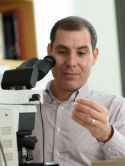Anti-ceramide single-chain variable fragment mitigates gastrointestinal-acute radiation syndrome and improves marrow reconstitution, rendering near-normal 90-day autopsies Journal Article
| Authors: | Nagesh, P. K. B.; Monette, S.; Shamu, T.; Giralt, S.; St. Jean, S. C.; Zhang, Z.; Fuks, Z.; Kolesnick, R. |
| Article Title: | Anti-ceramide single-chain variable fragment mitigates gastrointestinal-acute radiation syndrome and improves marrow reconstitution, rendering near-normal 90-day autopsies |
| Abstract: | Purpose: After September 11, 2001, nuclear threat prompted government agencies to develop medical countermeasures to mitigate two syndromes, the hematopoietic-acute radiation syndrome (H-ARS) and the higher-dose gastrointestinal-acute radiation syndrome (GI-ARS), both lethal within weeks. While repurposing leukemia drugs that enhance bone marrow repopulation successfully treats H-ARS, no mitigator potentially deliverable under mass casualty conditions preserves the GI tract. We recently reported that anti-ceramide single-chain variable fragment (scFv) mitigates GI-ARS lethality, abrogating ongoing small intestinal endothelial apoptosis to rescue Lgr5+ stem cells. Here, we examine long-term consequences of prevention of acute GI-ARS lethality. Methods and Materials: For these studies, C57BL/6J male mice were treated with 15 Gy whole body irradiation, the 90% GI-ARS lethal dose for this mouse strain. Results: Mice irradiated with 15 Gy alone or with 15 Gy + bone marrow transplantation (BMT) or anti-ceramide scFv, succumb to an ARS within 8 to 10 days. Autopsies reveal only mice receiving anti-ceramide scFv at 24 hours post-whole body irradiation display small intestinal rescue. No marrow reconstitution occurs in any group with attendant undetectable circulating blood elements. Mice receiving 15 Gy + BMT + scFv, however, normalize blood counts by day 12, suggesting that scFv also improves marrow reconstitution, a concept for which we provide experimental support. We show that at 14 Gy, the upper limit dose for H-ARS lethality before transition to GI-ARS lethality, anti-ceramide scFv markedly improves marrow take, reducing the quantity of marrow-conferring survival by more than 3-fold. Consistent with these findings, mice receiving 15 Gy + BMT + scFv exhibit prolonged survival. At day 90, before sacrifice, they display normal appearance, behavior, and serum biochemistries, and surprisingly, at full autopsy, near-normal physiology in all 42 tissues examined. Conclusions: Anti-ceramide scFv mitigates GI-ARS lethality and improves marrow reconstitution rendering prolonged survival with near normal autopsies. © 2023 Elsevier Inc. |
| Keywords: | survival; controlled study; unclassified drug; nonhuman; follow up; animal cell; mouse; animal tissue; cell death; apoptosis; gastrointestinal symptom; animal experiment; animal model; radiation exposure; blood; whole body radiation; adverse outcome; blood sampling; irradiation; bone; stem cells; bone marrow cell; blood cell count; leukocyte count; autopsy; gastrointestinal tract; bone marrow transplantation; mammals; femur; single chain fragment variable antibody; lethality; tibia; government agencies; radiation protection; ceramides; bone marrow aplasia; gastrointestinal; bloody diarrhea; medical countermeasures; lethal dose; cesium 137; male; article; september 11; pollakisuria; acute radiation syndrome; ceramide single chain fragment variable antibody; medical countermeasure; nuclear threats; single-chain variable fragments; single-chain variable fragments (scfv); whole body irradiation; comparative pathology; gastrointestinal acute radiation syndrome; small intestine crypt |
| Journal Title: | International Journal of Radiation Oncology, Biology, Physics |
| Volume: | 120 |
| Issue: | 2 |
| ISSN: | 0360-3016 |
| Publisher: | Elsevier Inc. |
| Date Published: | 2024-10-01 |
| Start Page: | 558 |
| End Page: | 569 |
| Language: | English |
| DOI: | 10.1016/j.ijrobp.2023.07.038 |
| PUBMED: | 37815783 |
| PROVIDER: | scopus |
| PMCID: | PMC10947531 |
| DOI/URL: | |
| Notes: | The MSK Cancer Center Support Grant (P30 CA008748) is acknowledge in the PDF -- Corresponding authors is MSK author: Richard Kolesnick -- Source: Scopus |
Altmetric
Citation Impact
BMJ Impact Analytics
MSK Authors
Related MSK Work










